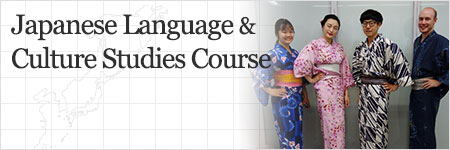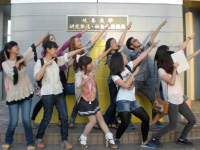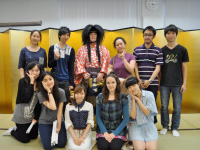 |
 |
|||||
|
 I studied at Gifu University for about a year. It was a great experience for me, as I major in the Japanese language at my home country. Unlike populous big cities, Gifu provides a tranquil, livable and comfortable environment. Overall, the Japanese Language & Culture Studies Course was challenging, because it included demanding Japanese language lessons and writing assignments. It is because of the challenging course that my Japanese level is now much higher than when I was studying in my home country. The most challenging tasks were writing reports in the first semester and a thesis in the second semester. I learned a lot about how to write reports and theses in Japanese. This experience will be useful when I write reports and theses at the university back in my home country. I also learned a lot from oral communication lessons, which were very difficult for me, since I was not good at speaking Japanese. My Japanese speaking skills improved through presentations and debates. Through this program, I learned a lot about Japan by attending various Japanese culture classes. Moreover, I was pleased that I was able to take optional subjects according to my interest. These optional subjects allowed me to attend classes conducted in Japanese together with Japanese students.
I studied at Gifu University for about a year. It was a great experience for me, as I major in the Japanese language at my home country. Unlike populous big cities, Gifu provides a tranquil, livable and comfortable environment. Overall, the Japanese Language & Culture Studies Course was challenging, because it included demanding Japanese language lessons and writing assignments. It is because of the challenging course that my Japanese level is now much higher than when I was studying in my home country. The most challenging tasks were writing reports in the first semester and a thesis in the second semester. I learned a lot about how to write reports and theses in Japanese. This experience will be useful when I write reports and theses at the university back in my home country. I also learned a lot from oral communication lessons, which were very difficult for me, since I was not good at speaking Japanese. My Japanese speaking skills improved through presentations and debates. Through this program, I learned a lot about Japan by attending various Japanese culture classes. Moreover, I was pleased that I was able to take optional subjects according to my interest. These optional subjects allowed me to attend classes conducted in Japanese together with Japanese students.
 My love for Japanese anime since I was a child led me to start specializing in Japanese, and eventually to study at Gifu University for one year as an exchange student. After enrolling in Gifu University, I took a Japanese placement test. To my surprise, I was placed in the most advanced class. Although I was happy to enroll in that class, I knew that the most advanced class would be the most challenging one. The first semester focused on learning Japanese. Although I had fewer classes to attend in the second semester, I had to do a lot of things to write a thesis. The first semester was tough for me, because I had no confidence in my Japanese skills, and often I could not make myself understood and could not understand what others were saying. I once thought of dropping out of the course after the first semester. However, my instructors and classmates encouraged me, enabling me to continue working hard to complete the one-year course. The second semester was also hard for me, because I had to complete my thesis. However, I think that overcoming this challenging task is one of the objectives of this course.
My love for Japanese anime since I was a child led me to start specializing in Japanese, and eventually to study at Gifu University for one year as an exchange student. After enrolling in Gifu University, I took a Japanese placement test. To my surprise, I was placed in the most advanced class. Although I was happy to enroll in that class, I knew that the most advanced class would be the most challenging one. The first semester focused on learning Japanese. Although I had fewer classes to attend in the second semester, I had to do a lot of things to write a thesis. The first semester was tough for me, because I had no confidence in my Japanese skills, and often I could not make myself understood and could not understand what others were saying. I once thought of dropping out of the course after the first semester. However, my instructors and classmates encouraged me, enabling me to continue working hard to complete the one-year course. The second semester was also hard for me, because I had to complete my thesis. However, I think that overcoming this challenging task is one of the objectives of this course.
 I had a very good time during the past year. I made many friends and enjoyed various activities. I am happy to have chosen to study at Gifu University.
I had a very good time during the past year. I made many friends and enjoyed various activities. I am happy to have chosen to study at Gifu University.